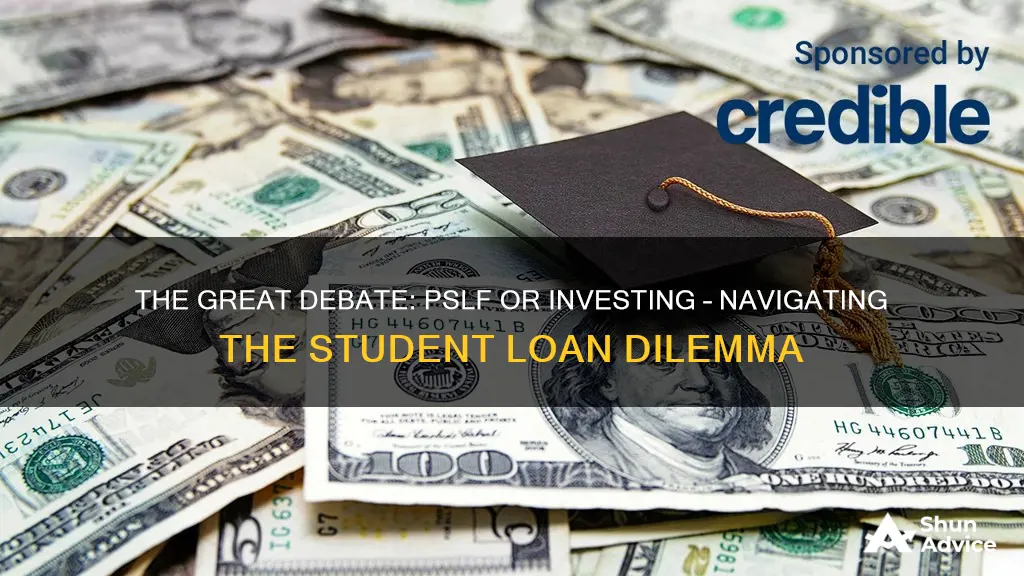
Paying off student loans or investing is a complex question because each person's goals are different. Both options have advantages and disadvantages. This article will discuss seven steps to help you decide which option is best for you. The first five steps are for those looking to keep it simple, while the last two are for those who want to take their plan to a more advanced level.
The first step is to understand the most important element of your finances: risk versus return. When deciding whether to pay off student loans or invest, you need to look at the net effect of how much money is going out of your pocket versus how much money is coming in.
The second step is to determine what student loan repayment plan you will be using. If you will be using an Income-Driven Repayment plan (IDR, REPAYE, PAYE, IBR, PSLF), then the choice is easy: save, save, save. This is because you are going for loan forgiveness, so there is no point in paying back something that will end up being forgiven anyway.
The third step is to get your employer match if they offer a retirement plan with a match. This is a great investment opportunity with zero risk and a high return.
The fourth step is to compare paying off your student loans or investing in after-tax investment accounts such as Roth IRAs or brokerage accounts. You need to look at the risk-free return on these investments compared to the interest rate on your student loans. If the investments return less than the interest rate on your student loans, then it makes financial sense to repay your loans rather than invest.
The fifth step is to consider what happens over time. If you can pay off your student loans aggressively and then save afterward, you will likely end up with more money than if you make minimum payments and invest at the same time.
The sixth step is to understand that not all investments have the same risk and return. When deciding whether to pay off student loans or invest, you need to look at the expected return on your investments compared to the interest rate on your student loans. If your investments are expected to earn a higher return than the interest rate on your student loans, then investing may be the better option.
The seventh step is to consider advanced topics such as the impact of pre-tax retirement accounts, buying a house versus paying off student loans, and starting a business instead of paying off student loans. These decisions involve a more complex financial analysis.
| Characteristics | Values |
|---|---|
| Interest rate | 6.8% |
| Monthly payment | $272 |
| Length of loan | 10 years |
| Total amount of student debt | $26,946 |
| Emergency fund | 3-6 months of expenses |
| Retirement contribution | 10-15% of income |
| Student loan interest rate | 5.8% |
| Student loan interest deduction | Up to $2,500 |
| Student loan forgiveness | PSLF, IDR, SAVE |
What You'll Learn

The pros and cons of paying off student loans early
Pros
- Save on interest: Student loans tend to have lower interest rates than other common forms of debt, such as credit cards. However, the substantial cost over time can be reduced by paying off your loans sooner, thus incurring less interest.
- Lower your debt-to-income ratio: Paying off student loans early can help lower your debt-to-income ratio, making it easier to take on other forms of debt, such as a mortgage or practice loan.
- Peace of mind: Dealing with debt can be stressful. Paying off your student loans early can provide a sense of relief and improve your overall wellness.
- Good debt vs. bad debt: Student loans are generally considered "good debt" as they are an investment in your future and can increase your net worth. Paying off this type of debt early can be a positive return on investment.
Cons
- Emergency fund: It is generally recommended to have 6-12 months of living expenses readily available in case of emergencies. Using this savings to pay off student loans early may leave you financially vulnerable.
- Tax advantages: Interest on student loans is tax-deductible up to a certain amount each year. Paying off your student loans early may result in forfeiting this advantage.
- Federal loan repayment options: Certain federal loan repayment options, such as Public Service Loan Forgiveness (PSLF) or Income-Driven Repayment (IDR), offer forgiveness programs or flexible repayment plans. Taking advantage of these options may be more beneficial than paying off your loans early.
- Higher interest debt: It is generally not advisable to prioritize student loans over higher interest debt, such as credit card debt. Paying off student loans early may result in incurring higher interest rates on other forms of debt.
Bezos' Current Investment Focus
You may want to see also

The pros and cons of investing
Investing in stocks can be a great way to build wealth, but it's not without its downsides. Here are some pros and cons to help you decide if investing is right for you:
Pros of Investing in Stocks:
- Building Massive Wealth: Over the long term, the stock market has averaged annual gains of close to 10%. Even with a more conservative 8% annual gain, investing a few thousand dollars each year can turn into hundreds of thousands or even millions of dollars over a few decades.
- No Need for a Finance Degree: You don't need to be a financial expert to invest successfully. Broad-market index funds or ETFs can get you similar returns to the overall stock market without the need for in-depth analysis.
- Diversity of Options: There are many different types of stocks to choose from, allowing you to invest in exciting new companies or established dividend-paying ones. You can also focus on specific industries that interest you. Diversifying your portfolio across different companies and industries is generally a good idea to reduce risk.
- Low Barrier to Entry: You don't need a lot of money to start investing in stocks. You can buy a few shares or fractions of shares and build your portfolio over time.
- Liquidity: Stocks are easily accessible and can be bought or sold on any weekday the market is open. This liquidity means you can quickly convert your stocks into cash if needed.
- Beating Inflation: Historically, the stock market's returns have outpaced inflation, helping investors maintain and grow their wealth over time.
Cons of Investing in Stocks:
- No Guaranteed Returns: While stocks tend to outperform other investments over the long term, there are no guarantees. The stock market can be volatile, and you may not see positive returns over shorter periods.
- Time Commitment: Building wealth through stocks generally takes decades. You need to be patient and allow your investments to grow over time.
- Market Volatility: The stock market goes through corrections and crashes, and you need to be prepared for these downturns without panicking and selling at a loss.
- Risk of Loss: Investing in stocks carries the risk of losing money, especially if you don't understand what you're doing. Common mistakes include not paying off high-interest debt before investing, speculating on risky stocks, or trying to time the market.
- Emotional Rollercoaster: The ups and downs of the stock market can be emotionally challenging, and it's important not to make impulsive decisions based on short-term fluctuations.
Remember, investing in stocks is just one option for growing your wealth. Consider your financial goals, risk tolerance, and time horizon before deciding if investing is right for you. Diversification across different types of investments can also help manage risk.
Mortgage Freedom or Investment Gains: Where Should Your Money Go?
You may want to see also

The impact of interest rates on student loans
Interest rates on student loans can have a significant impact on borrowers, affecting their monthly payments, the total cost of the loan, and their overall financial health. Here are some key points regarding the impact of interest rates on student loans:
Federal Student Loan Interest Rates:
- Federal student loan interest rates are set by Congress each year and are fixed for the life of the loan.
- The interest rate for federal loans is the same for every borrower and is based on the type of loan (e.g., undergraduate, graduate, or parent PLUS loans) and does not depend on the borrower's credit score or financial history.
- For the 2024-25 school year, federal student loan interest rates range from 6.53% to 9.08%.
- Changes in federal student loan interest rates do not affect existing loans but will impact new loans taken out after the rate change.
Private Student Loan Interest Rates:
- Private student loan interest rates are offered by banks, credit unions, and online lenders and can be either fixed or variable.
- The interest rate for private student loans is based on the borrower's credit score, income, and other financial factors, as well as market conditions.
- Variable interest rates on private student loans may change when the Federal Reserve raises or lowers rates, which can impact the monthly payment and the total interest paid over the life of the loan.
- Private student loan interest rates for graduate and undergraduate students can range from roughly 4% to 17%.
The Impact of Interest Rates on Borrowers:
- Higher interest rates on student loans result in higher monthly payments and a higher total cost for the loan.
- When interest rates are low, borrowers may benefit from refinancing their student loans to secure a lower interest rate, which can reduce their monthly payments and the total cost of the loan.
- For borrowers with high-interest student loans, it may be financially beneficial to prioritize paying off the loans over investing, as the interest charges can outweigh the potential returns from investments.
- Conversely, if student loan interest rates are relatively low, borrowers may consider investing their money instead of making early payments, as they could potentially earn higher returns in the stock market or other investments.
- It is important for borrowers to consider their overall financial situation, including emergency funds and other financial goals, when deciding whether to prioritize paying off student loans or investing their money elsewhere.
Startups: Invest or Avoid?
You may want to see also

The potential returns on investments
If you are a conservative investor, you may be looking at returns of 5-6% per year. If you are more aggressive, you may be looking at returns of 10% or more. Of course, you could also lose money in any given year. Over the long term, the stock market has always gone up, but that doesn't mean it always will.
If you are investing in a tax-advantaged account, such as a 401(k) or IRA, you will also get a tax benefit, which will increase your returns. For example, if you are in the 25% tax bracket and you contribute $10,000 to a traditional 401(k), you will save $2,500 in taxes, which is like earning a 25% return on your investment.
If you are investing in a taxable account, you will have to pay taxes on any gains you realize, which will reduce your returns. For example, if you buy a stock for $100 and sell it for $200, you will owe taxes on the $100 gain. If you are in the 15% capital gains tax bracket, you will owe $15 in taxes, reducing your return to $85.
It's also important to remember that investing is a long-term proposition. The stock market can be volatile in the short term, and you could lose money if you need to sell your investments at the wrong time. It's generally recommended that you only invest money in the stock market that you won't need for at least 5-10 years.
So, while the potential returns on investments can be quite high, there are also risks and uncertainties involved. It's important to carefully consider your financial goals, risk tolerance, and time horizon before deciding how much to invest.
Meta: Invest or Not?
You may want to see also

The type of student loan
Federal Student Loans
Federal student loans generally have lower interest rates than private loans and come with more benefits, like Public Service Loan Forgiveness (PSLF), where your remaining balance is discharged after 10 years of monthly payments. If you only have federal loans and you qualify for a forgiveness program, investing rather than paying them off could make more sense.
Private Student Loans
Private student loans often have higher interest rates than federal loans. If you have private student loans, there is less to lose by prioritizing repayment, and potentially more to gain by refinancing. Student loan refinancing can decrease your interest rates, letting you pay off loans faster and free up money for other financial goals, like saving or investing.
Refinancing Federal Student Loans
Refinancing federal student loans can be risky because you'll lose federal benefits and other protections. Be sure you won't need those benefits before going this route.
Amer Sports: Who Invests?
You may want to see also
Frequently asked questions
PSLF stands for Public Service Loan Forgiveness. It is a federal program that forgives the remaining balance on your Direct Loans after you have made 120 qualifying monthly payments while working full time for a qualifying employer.
There is no one-size-fits-all answer to this question. It depends on your financial goals, risk tolerance, and comfort with debt. However, as a general rule of thumb, if you have high-interest student loans, especially private loans, it is advisable to prioritize paying them off first. On the other hand, if you have low-interest student loans and expect long-term returns on your investments to be higher, investing may be a better option.
Paying off student loans early can bring peace of mind and reduce the amount of interest paid over time. It can also help you qualify for a mortgage or achieve other financial goals that may have been hindered by your student loan debt.
Investing early and consistently can help you build wealth for the future, potentially allowing you to retire earlier. Additionally, if your employer offers to match your contributions to a retirement plan, investing can provide a guaranteed return with zero risk.







